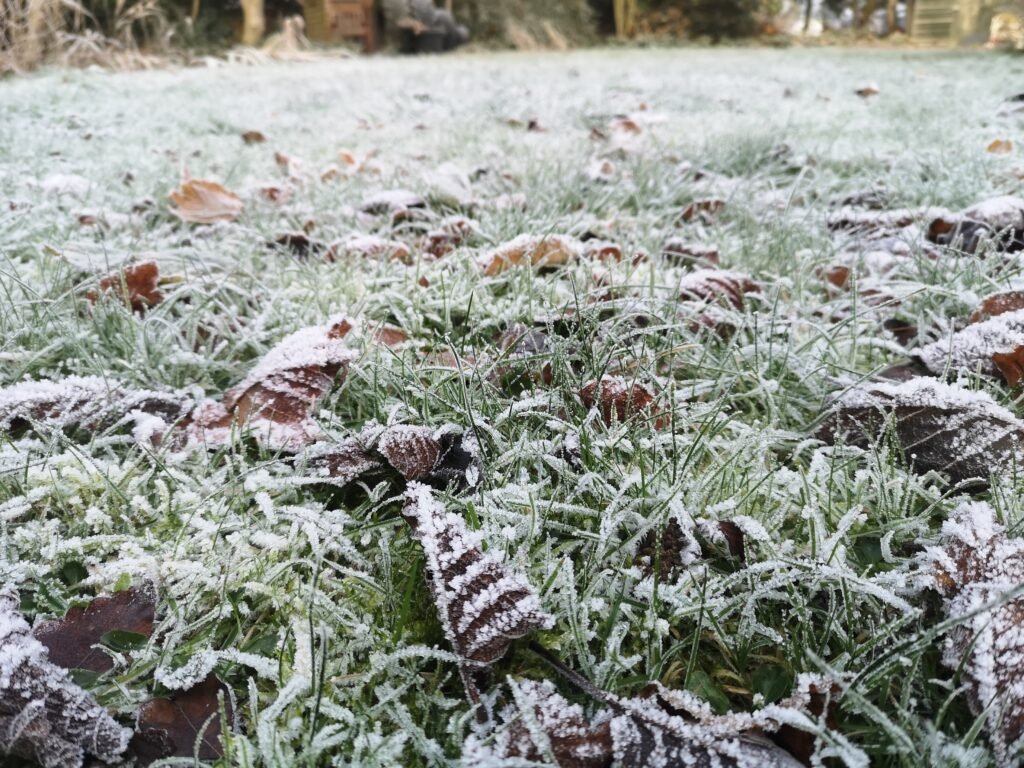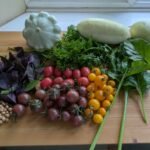What are frost dates?
There are two types of frost dates that are used for gardening. The first frost date is the date in which you can expect to get the first frost of the year, and the last frost date is the expected time that you will receive the last frost of that year. By year I’m referring to the gardening year, starting with the first frost date and carrying on for an entire year until that time comes again.
Your last frost date will typically be in spring, and your first frost date in late autumn or early winter. The website I use, linked later on in this post, gives the dates in a 10-day range, and should be used more as a rough guide than an exact number. For example, my first frost in 2024 was a month before I would usually expect it. It’s a good idea to have your rough frost dates in mind, but keep an eye on the weather forecast, even as early as a month or two out from those dates.
You can get a ground frost when the air temperature is as high as 4°C (39°F), although that’s usually only on a clear night and will only be a light frost, meaning that only the ground will freeze and not the air. This can still cause problems for plants, so you’ll want to look out for temperatures just above 0°C (32°F) when looking for frosts.

Planning with the last frost
The last frost date typically signals the date from which you can plant seedlings out. Some plants, such as spinach and peas, are fine to be planted out when it’s still cold, however most summer crops can be killed by a frost, so it’s best to wait until you won’t get any more frosts for the year for most plants. If you want to plant out before the last frost in your area, there are multiple ways in which you can do this and protect your plants. Cold frames, greenhouses, polytunnels, or growing inside.
I will be referencing the last frosts a lot more than the first frosts in other posts, as the last frost of the year is relevant to planting out a lot of seedlings or sowing seeds outside, whereas lots of plants are harvested before the first frost. It’s a good idea to note down your expected range for first and last frosts, as it’s easier to reference frost dates for plantings because it will be different for everyone.
Planning with the first frost
The first frost date typically signals the date at which the ‘summer’ growing period is over. Some plants, such as carrots, parsnips, as well as some brassicas, can be grown or stay in the ground during winter, but many common plants won’t survive, or do very well, when the weather gets that cold, so you’ll want to be harvesting most things before this time of year.
When are your frost dates?
Frost dates can vary quite a lot within the UK, and much more country to country. Some places in the UK may not even get a frost for the entire year, others might be frost-free from late February onwards, giving them very long growing windows. April is the most common month in the UK for people to be getting their last frost, whereas those with the shortest growing window may have to wait until late June for the frosts to leave for summer. It’s early May where I live.
https://www.plantmaps.com/interactive-united-kingdom-last-frost-date-map.php
The earliest first frosts in the UK, for those that can expect a frost, should come at the start of October. However this year (2024) much of the UK had frosts in early October. The last 10 days of November and first 10 days of December are the most common times to get a first frost within the UK. However, some places do not get a frost until January.
https://www.plantmaps.com/interactive-united-kingdom-first-frost-date-map.php

I am proud to be affiliated with JustSeed, a company that I have bought seeds from for a few years now. I believe in what they are doing over there, and if you are going to buy seeds, garden tools, or seedlings, then please consider checking them out and using my link below to do so. Thank you for supporting me.






Leave a Reply